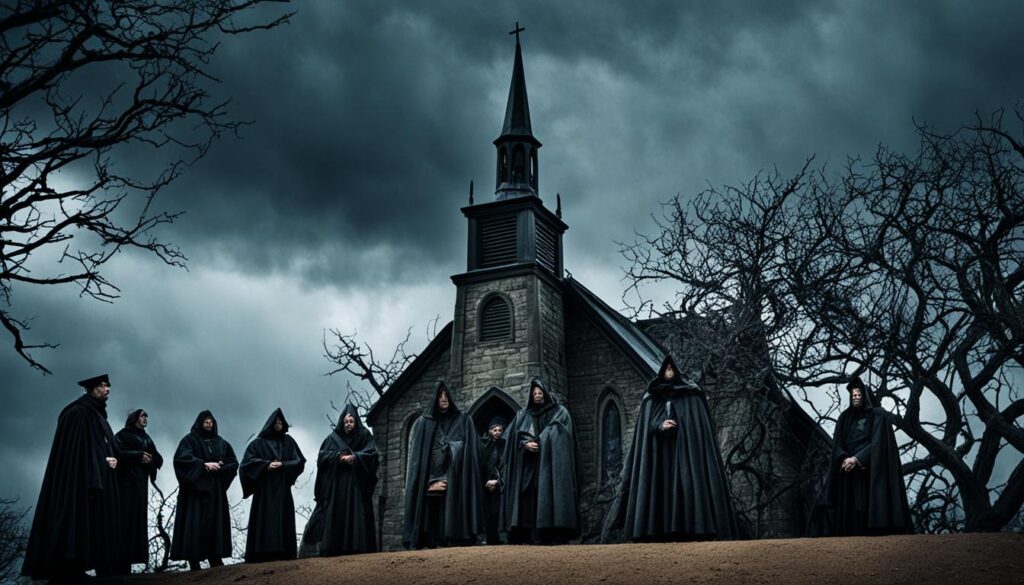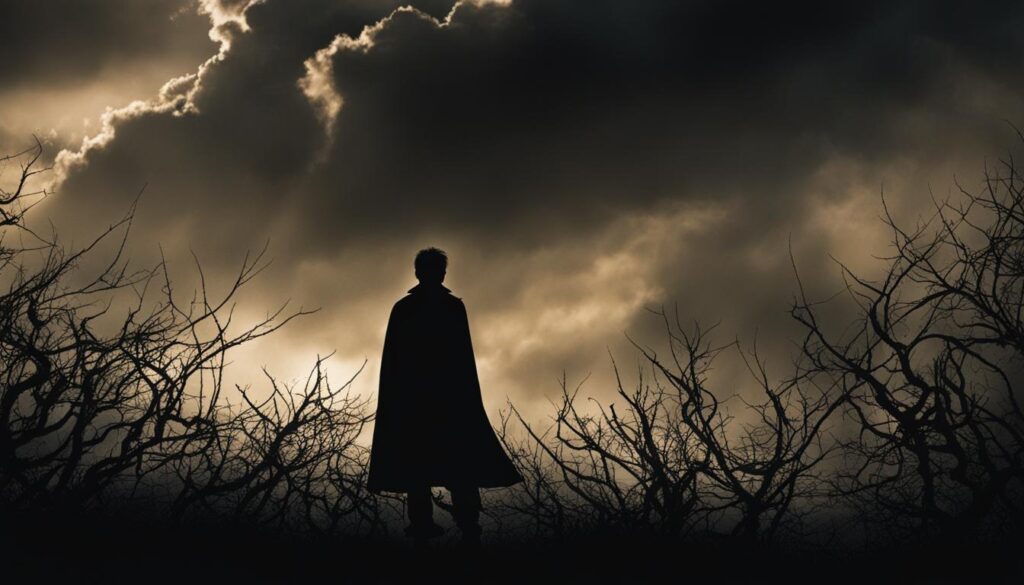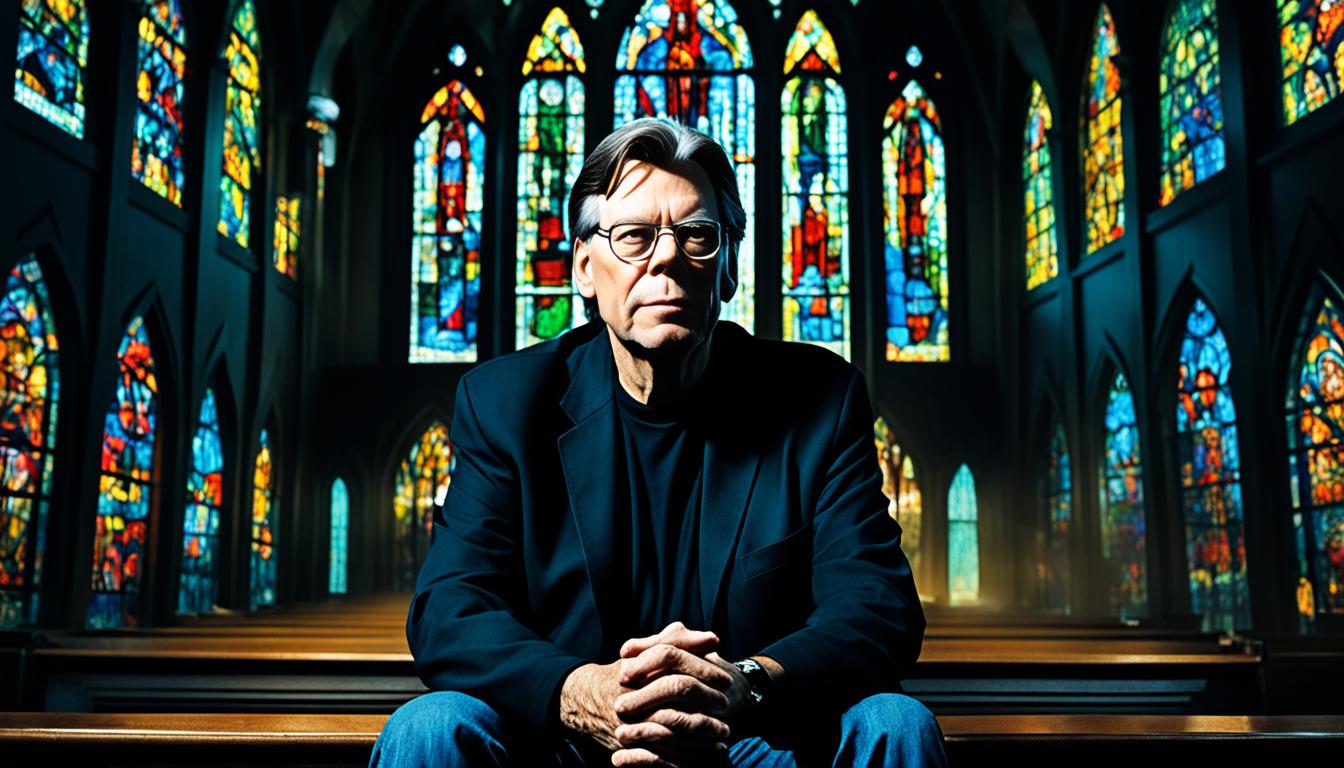Stephen King is a household name, famous for his chilling horror writing. While King’s works often revolve around the supernatural, there is another theme that runs through his storytelling: religion. The impact of faith and belief can be seen in many of King’s books, weaving itself into his plots and characters. In this article, we will explore Stephen King’s unique perspective on religion and its influence on his writing.
Stephen King’s Spiritual Background
Stephen King’s novels are known for their thrilling suspense and horror elements, but religion also plays a crucial role in his writing. To fully understand King’s religious themes, it is important to examine his spiritual background and how it has influenced his perspective.
| Religious Upbringing | Influence on Writing |
|---|---|
| Kings’s Family was Methodist | King’s Methodist upbringing exposed him to religion from an early age. His mother was an evangelical Christian, and he attended church regularly. King has credited his mother’s faith with sparking his imagination and inspiring some of his earliest writing. |
| King’s Religious Studies in College | While studying English at the University of Maine, King took a course on the Bible as literature. This course deepened his understanding of religious myths and archetypes and ultimately influenced his writing. |
| King’s Spiritual Experiences | King has stated that he has had numerous spiritual experiences throughout his life, including his recovery from drug and alcohol addiction. These experiences have influenced his writing, infusing it with a sense of mysticism and spirituality. |
Overall, King’s religious background has had a profound impact on his writing. It has allowed him to explore the themes of faith, belief, and the supernatural in a unique and thought-provoking way.
Religion as a Theme in Stephen King’s Works
Stephen King is known for weaving religious themes into his stories, often exploring the dynamics of faith, belief, and the supernatural. In books like Carrie, The Stand, and Revival, King sets his characters against a religious backdrop, exploring the impact of religion on their lives and the world around them.
King’s use of religion as a theme is both complex and thought-provoking, often presenting it as a powerful force that can both uplift and corrupt. The notion of a higher power is a recurring presence in King’s books, whether it takes the form of a divine being or a supernatural force.
| Book Title | Religious Theme |
|---|---|
| Carrie | The destructive power of fanaticism and the dangers of religious fundamentalism |
| The Stand | The battle between good and evil, with religious undertones throughout |
| Revival | The pursuit of meaning in life and the consequences of obsession with the unknown |
King’s exploration of religion as a theme is not limited to Christianity, though it is a prevalent focus. He incorporates various religious practices, including Eastern philosophies and mysticism, into his stories, often presenting them as counterpoints to traditional beliefs.
Overall, King’s use of religion as a theme is a testament to his abilities as a storyteller to explore complex topics in a compelling and multi-dimensional way. It adds depth and complexity to his narratives, challenging readers to think critically about their own beliefs and the world around them.
King’s Critique of Organized Religion
Stephen King’s literary works often critique organized religion, depicting it as a source of repression, hypocrisy, and violence. In his view, religion can be a powerful force for good, providing solace, hope, and a sense of purpose to individuals. However, when it is institutionalized and corrupted by those in power, it can become a tool for oppression and manipulation.
One of the most prominent examples of King’s critique of organized religion can be found in his novel “Carrie.” The character of Margaret White is portrayed as a fanatical and abusive mother who justifies her violence towards her daughter through religious doctrine. In “The Mist,” a group of religious zealots resort to human sacrifice in their attempt to appease a supposed divine entity.
However, it is essential to note that King’s portrayal of religion is not entirely negative. In his nuanced approach, he acknowledges the positive impact religion can have on individuals while condemning the abusive practices and exploitative nature of religious institutions.

In conclusion, King’s critique of organized religion adds depth and complexity to his storytelling, providing social commentary and compelling characters that challenge conventional beliefs and practices.
Influence of Religion on King’s Characters
Stephen King is known for his skill in creating compelling characters that the readers can relate to. One of King’s techniques is to develop his characters through their beliefs and experiences, including their religious beliefs. King’s characters often encounter supernatural forces that challenge their belief systems and force them to confront their deepest fears. In this way, religion plays a significant role in shaping the development of King’s characters, adding depth and complexity to their journeys.
One example of the influence of religion on King’s characters is seen in his novel, The Stand, where two opposing factions emerge after a deadly pandemic. One faction follows Mother Abigail, a spiritual leader who draws inspiration from the Bible, while the other faction follows Randall Flagg, a demonic figure who offers power and pleasure in exchange for loyalty. The conflict between these two factions highlights the importance of religious beliefs and their influence on human behavior.
Another example of King’s use of religion is in his novel, Carrie, where the protagonist struggles with her oppressive religious upbringing and her emerging telekinetic powers. Carrie’s religious beliefs affect her relationships with her peers and her mother, and ultimately lead to her tragic downfall.
King’s use of religion demonstrates his understanding of its power and influence on human behavior and the human psyche. His characters are not one-dimensional, but are complex and dynamic, shaped by their beliefs and experiences. Through his storytelling, King asks his readers to question their own beliefs and the role that religion plays in their lives.
The Power of Belief in King’s Narratives
Stephen King’s works are intimately tied to themes of belief and the power it holds.
King’s storytelling often highlights the stark difference between the beliefs of his protagonists and antagonists, resulting in plotlines driven by life or death stakes.
Novels like “The Stand” and “Salem’s Lot” showcase how faith can drive humans to perform extraordinary feats, whether it be the stand against a deadly pandemic or the eradication of a town’s vampire scourge.
On the other hand, works like “Carrie” and “Misery” illustrate how belief systems can become toxic and motivate people to commit terrible acts.
In many of King’s novels, the belief in the supernatural holds a significant sway over the story’s outcome. Characters who cling to their skepticism often find themselves in peril, while those who open their minds to the fantastic can find salvation.
Ultimately, King shows us that belief is a powerful force that can propel us to greatness or lead to our downfall. It’s a theme that runs throughout his works and continues to captivate readers worldwide.
Stephen King’s Commentary on Good vs. Evil and God’s Role
Stephen King has consistently explored the complex relationship between good and evil throughout his writing. The author’s fascination with the subject stems from his belief that evil is not always an external force but rather an intrinsic part of human nature. In many of his narratives, King emphasizes the role of free will in shaping characters’ choices, and how their decisions ultimately determine good or evil outcomes.
Through his writing, King also offers commentary on the role of God in relation to good and evil. In his novel “The Stand,” the author presents a post-apocalyptic world where survivors must choose between two leaders: one representing the forces of good, and the other representing the forces of evil. However, King’s interpretation of good and evil is not always tied to religious beliefs.

King also explores the idea of morality without the influence of a higher power, often creating characters who question the existence of God and the concept of an afterlife. For example, in his novel “The Shining,” King creates a character who grapples with his own morality and the morality of others without the guidance of religion.
Good vs. Evil in Stephen King’s Works
| Novel/Short Story | Representation of Good | Representation of Evil |
|---|---|---|
| “The Stand” | The forces of good are represented by Mother Abagail and the Boulder Free Zone community, who seek to rebuild society after a devastating plague. | The forces of evil are represented by Randall Flagg and his followers, who seek to create a new world order from the ashes of the old one. |
| “Carrie” | Carrie’s mother represents her daughter’s morality, imparting a rigid sense of right and wrong. | The students who bully and torment Carrie, pushing her to unleash her telekinetic powers in a violent massacre. |
| “The Dark Tower Series” | The gunslinger, Roland Deschain, is a flawed hero who fights for the will of God and the salvation of his world. | The character of the Man in Black represents chaos and evil, seeking to undermine Roland’s quest at every turn. |
Overall, Stephen King’s examination of good versus evil and the role of God in his stories serves to deepen his narratives and add layers of complexity to his characters. Through his exploration of the human condition, King creates stories that resonate with readers on a profound level.
Stephen King’s Perspective on the Supernatural and the Divine
Stephen King’s fascination with the supernatural and the divine is evident in his various works. His unique perspective on these themes reveals a deeper understanding of the human condition, and the intricacies of the spiritual realm.
King’s portrayal of otherworldly forces is both intriguing and chilling. From demonic entities to ghosts, his stories often leave readers on the edge of their seats, creating a thrilling and captivating experience.
However, King’s portrayal of the divine is equally compelling. He often explores the idea of a higher power, questioning the role it plays in our lives and the world we inhabit. His works showcase a unique balance of skepticism and fascination, which adds depth and complexity to his narratives.
The Significance of King’s Perspective
Stephen King’s perspective on the supernatural and the divine invites readers to explore their own beliefs and fears. His captivating storytelling and insightful commentary offer a fresh perspective on these themes, providing readers with a unique and thought-provoking experience.
| Pros | Cons |
|---|---|
| Offers a new perspective on the supernatural and the divine | May be too intense for some readers |
| King’s unique perspective adds depth and complexity to his stories | May be controversial due to his portrayal of certain religious themes |
| Invites readers to question their own beliefs and fears | Some readers may find his works to be disturbing or unsettling |
Overall, Stephen King’s perspective on the supernatural and the divine is a significant aspect of his legacy as a master storyteller. His ability to captivate and intrigue readers with his exploration of these themes is a testament to his talent and skill as a writer.
Reader Reception and Controversies
Stephen King’s religious themes have always been a topic of discussion among his readers. Some have admired his approach to exploring faith and spiritual beliefs, while others have criticized him for being too irreverent or for going too far with his descriptions of violence and horror.
However, the controversies surrounding King’s work often cannot be attributed to religious themes alone. For example, the 1984 bestselling novel, The Tommyknockers, received mixed reviews from readers and critics alike. While some praised its imaginative plot and engaging characters, others found it to be overindulgent and meandering.
Similarly, the 1996 novel, Desperation, was met with a fair amount of controversy, not because of its religious themes, but because of its graphic descriptions of violence and torture.
Despite these criticisms, Stephen King’s fan base remains strong, and his influence on the horror genre is undeniable. He continues to create thought-provoking narratives that deeply explore human nature and the world around us.
Reader Reception and Controversies
| Novel | Publication Year | Reader Reception | Controversies |
|---|---|---|---|
| The Tommyknockers | 1984 | Mixed | None exclusively related to religious themes |
| Desperation | 1996 | Mixed | Controversial and graphic violence and torture scenes |
Conclusion
In conclusion, Stephen King’s views on religion have played a significant role in shaping his storytelling and legacy as a master of horror. Through his spiritual background and experiences, King has incorporated religious themes, beliefs, and critiques into his works to explore the human condition and the roles of faith and belief in our lives.
King’s characters often embody the influence of religious experiences and beliefs, highlighting the power of belief and the consequences of its absence. His exploration of good versus evil and the role of God in his narratives adds depth and complexity to his stories, while his portrayal of the supernatural and the divine challenges our perceptions of reality.
While some readers may have found his religious themes controversial, they have undoubtedly contributed to King’s success as a writer and his ability to captivate audiences with his unique and insightful perspectives. As we continue to explore the complex relationship between religion and literature, we can look to Stephen King as a trailblazer in the field and a master of the craft.



